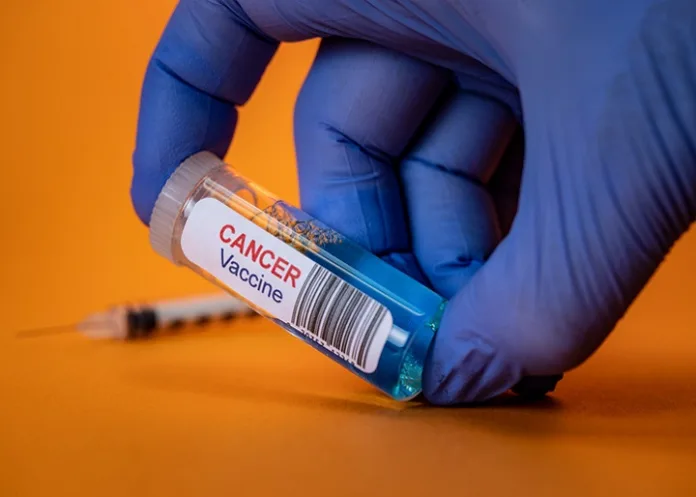Half a dozen cancer vaccines showing promise or in development since May 2023 offer a glimmer of hope to millions of people. Becker’s Hospital Review breaks down the hopefuls.
1. Early trials of a vaccine that targets a specific gene found in tumours, known as KRAS, has proven to be effective in 84% of patients who had pancreatic or colorectal cancers recur after their initial treatment, said researchers at Memorial Sloan Kettering Cancer Centre in New York City who co-led the study.
Pancreatic and colorectal cancer, two of the leading causes of cancer deaths in the US, are also known to have few effective treatments when relapse occurs. The new vaccine could improve outcomes and survival rates, if results can be repeated in future studies.
Currently, the data are only from a phase 1 trial. Even though testing is early and was conducted using only 25 patients, the strong results are “exciting, because they show we may have more than one way to activate immune cells to target these cancers”, said Eileen O’Reilly, MD, lead author of the study and a gastrointestinal oncologist at Memorial Sloan Kettering.
2. Biotech company Orbis Health Solutions was approved to begin a phase 3 clinical trial of its melanoma vaccine. The tumour lysate particle only cancer vaccine was tested in 187 patients in the phase 2 clinical trial. Nearly 95% of patients given only the vaccine were alive three years after starting treatment, and 64% were still disease-free.
Among stage 3 melanoma patients, 60% in the vaccine-only group were disease-free after three years, compared with 39% in the placebo group. Stage 4 melanoma patients had even higher disease-free survival at 68%.
The most common side effects were redness or pain at the injection site, and fever and fatigue after injection.
The phase 3 clinical trial is set to begin this year, and will include 500 people and span three years.
3. Results from a phase 2 trial found a drug-vaccine combination developed by Merck and Moderna cut the risk of recurrence or death in patients with severe melanomas by 49%. The experimental therapy involves an mRNA vaccine from Moderna in combination with Merck’s cancer drug Keytruda.
Patients with resected stage 3 or 4 melanoma who received the combination therapy were 49% less likely to die or have their cancer return within three years, compared with those who received only Keytruda.
The findings build on results from an earlier phase study that followed patients for two years.
Moderna and Merck started a phase 3 trial in July 2023. The trial could take up to four years to confirm earlier stage results, though federal regulators could move to make the treatment available to some patients sooner.
4. A breast cancer vaccine has shown promise in a phase 1 trial spearheaded by researchers at the University of Washington’s Cancer Vaccine Institute and is preparing to move to phase 2.
The study gave three doses of vaccine over three months to 66 patients with stage 3 or 4 HER2-positive breast cancer. The patients were effectively cured of cancer through chemotherapy treatment before the vaccination. However, HER2-positive breast cancers are aggressive with a high probability of recurrence and metastasis.
After 10 years, patients who received the vaccine had a mean survival rate of 85%, compared with 50% at 4.5 years for those without. Researchers found strong immune responses in all doses of the vaccine, but the middle dose appeared to be more effective, with a sustained immune response over time.
Another breast cancer vaccine, created by Cleveland Clinic and designed for triple-negative breast cancer, moved out of a phase 1 trial in February last year.
5. A new vaccine, called SurVaxM, that fights the deadliest form of brain cancer, glioblastoma, has shown promise in early trials. It was found to extend survival time from 12 to 18 months to 26 months, on average.
Now a phase 2 trial will enrol up to 270 patients across 10 sites in the US and China. Participants will receive four doses of SurVaxM, spread over two months, followed by a booster every two months. They will also undergo brain scans every two months to monitor for signs of progression.
The earliest results are expected in mid-2024.
6. A small, phase 1 study found promising results for a pancreatic cancer vaccine. It involved 16 patients with pancreatic cancer. Researchers at the Memorial Sloan Kettering Cancer Centre extracted patients’ tumours and shipped samples to the vaccine manufacturer in Germany.
Scientists then developed personalised vaccines based on the genetic makeup of certain proteins in the samples. Created in nine weeks, the vaccines were then shipped and administered to patients.
Half of participants had an immune response and showed no signs of relapse after an 18-month follow-up period. For those without a response to the vaccine, the cancer tended to return around 13 months after surgery.
Although the study is limited, experts have lauded the accomplishment.
Becker’s Hospital Review article – 6 cancer vaccines showing promise (Open access)
See more from MedicalBrief archives:
Scientists at ‘turning point’ with cancer vaccines
Small pancreatic cancer vaccine trial shows promise
How close are scientists in developing an mRNA cancer vaccine?

